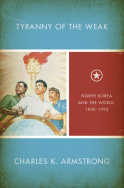 A historian based at Columbia University has returned a 2014 prize after criticisms prompted him to issue more than 70 corrections to his prominent book about North Korea.
A historian based at Columbia University has returned a 2014 prize after criticisms prompted him to issue more than 70 corrections to his prominent book about North Korea.
Charles Armstrong told Retraction Watch he returned the 2014 John K. Fairbank Prize he received for “Tyranny of the Weak” due to “numerous citation errors.” The book has faced heavy criticism, including allegations of plagiarism and using invalid sources.
The American Historical Society, which issues the Fairbank Prize, released a statement last week:
In 2014, the American Historical Association (AHA) awarded its John K. Fairbank Prize to Tyranny of the Weak: North Korea and the World, 1950–1992, by Charles K. Armstrong. After careful review the AHA identified a set of citations that did not meet professional standards. In response to AHA queries, Dr. Armstrong reviewed his work and the underlying scholarship and identified a number of instances where the source citations were incorrect. Dr. Armstrong has corrected the citation errors and, out of respect for the AHA, has returned the Fairbank Prize.
According to Columbia’s description of the prize when it was initially awarded:
Established by a gift to the Association from the friends of the prominent historian of China and East Asia at Harvard and President of the Association in 1968, the John K. Fairbank Prize is awarded for the best work on the history of China proper, Vietnam, Chinese Central Asia, Mongolia, Manchuria, Korea, or Japan since the year 1800.
Armstrong told us:
Due to the numerous citation errors in my book, I have decided to return the prize out of respect for the AHA. I have made more than 70 corrections that will appear in the corrected edition of Tyranny of the Weak, which has gone to press and will be available by mid-July this year.
Late last year, Armstrong announced on his blog that he would be making 52 corrections to the book.
Balazs Szalontai of Korea University has claimed the book contains 90 issues, including plagiarism covered by unrelated or invalid sources.
Like Retraction Watch? Consider making a tax-deductible contribution to support our growth. You can also follow us on Twitter, like us on Facebook, add us to your RSS reader, sign up on our homepage for an email every time there’s a new post, or subscribe to our daily digest. Click here to review our Comments Policy. For a sneak peek at what we’re working on, click here.
Is the investigation about plagiarism, cheating and misconduct for this person limited to only the book “Tyranny of the Weak”, or will be extended to all other academic degrees (PhD thesis from U of Chicago), awards (Fulbright, Humboldt, etc.), scholarly articles, and research grants? Without strong internal support, it seems hard to conduct plagiarism at this level and promote to full professor level.
I followed your link to the earlier Retraction Watch post on this matter and found an amazing exchange: first a series of complaints by Balazs Szalontai which, if correct, imply that Armstrong did not just have “citation errors” but behaved unethically. (In his later note, Armstrong refers to the old, old excuse of “multiple transfers of notes, some made by my research assistants and others done by myself.”) Anyway, in that earlier post, Armstrong responded to Szalontai’s criticism with this:
As if the only reason one would want to criticize bad work is because you’ve been offended.
Flip it around, and you see that Armstrong was saying, essentially, that all he has to do is “never offend” people and include their books in his bibliography, and he should be immune from criticism.
It’s embarrassing to see such an attitude here at Columbia University.
“all he has to do is “never offend” people and include their books in his bibliography, and he should be immune from criticism”.
That accurately reflects my observations of how people succeed in academia.
Columbia recently awarded him a Presidential Innovation Fund Grant
http://weai.columbia.edu/charles-k-armstrong-receives-2017-presidential-innovation-fund-grant-from-columbia/
Charles K. Armstrong Receives 2017 President’s Global Innovation Fund Grant from Columbia
June 1, 2017 by Ross Yelsey
Charles K. Armstrong, the Korea Foundation Professor of Korean Studies in the Social Sciences at Columbia University, has received a 2017 President’s Global Innovation Fund Grant from Columbia University for the project “Educational Exchange with Scholars from the Democratic People’s Republic of Korea.” Professor Armstrong will coordinate the project with Joseph Terwilliger, Professor of Neurobiology (in Psychiatry, the Gertrude H. Sergievsky Center, and in Genetics and Development) in the Columbia University College of Physicians and Surgeons. The projects selected all make use of the network of Columbia Global Centers and provide opportunities for faculty and students to address pressing global issues.
“I have made more than 70 corrections that will appear in the corrected edition of Tyranny of the Weak, which has gone to press and will be available by mid-July this year.”
Where is it?
Inside Higher Education 5 Jul:
“Armstrong said, ‘I would rather not go into the details of the errors at this point, but I can tell you that Cornell University Press has issued a corrected edition that I believe will be available in the next week or two.’”
“Dean J. Smith, director of the Cornell University Press, said paperback and electronic versions of the book are about to be available, with corrections made by Armstrong.”
Almost 2 weeks now and no sign of the “corrected” edition anywhere.